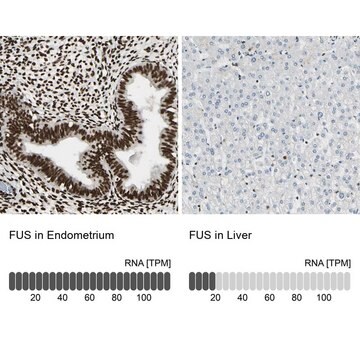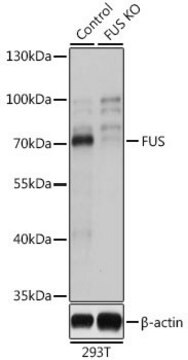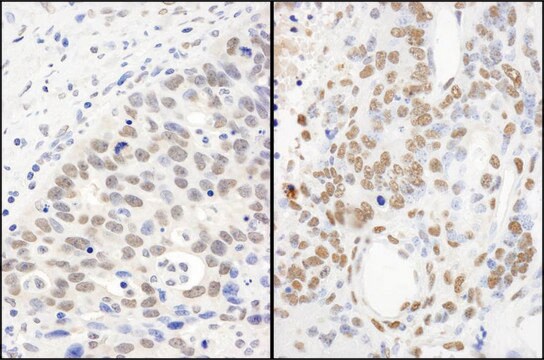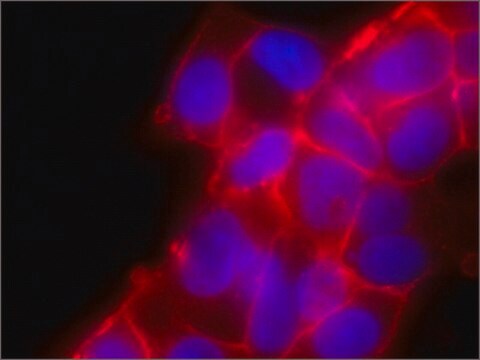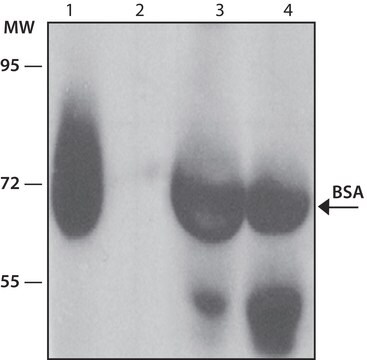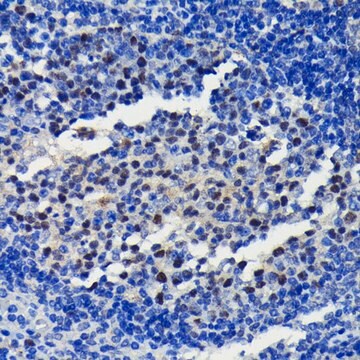推薦產品
生物源
rabbit
共軛
unconjugated
抗體表格
affinity isolated antibody
抗體產品種類
primary antibodies
無性繁殖
polyclonal
形狀
buffered aqueous solution
分子量
antigen ~68 kDa
物種活性
rat, human
加強驗證
independent
Learn more about Antibody Enhanced Validation
濃度
~1.0 mg/mL
技術
immunohistochemistry: 5-10 μg/mL using formalin-fixed paraffin embedded rat colon.
indirect immunofluorescence: 2.5-5 μg/mL using HeLa cells.
western blot: 1.5-3.0 μg/mL using using lysates of Jurkat cells.
UniProt登錄號
運輸包裝
dry ice
儲存溫度
−20°C
目標翻譯後修改
unmodified
基因資訊
human ... FUS(2521)
rat ... Fus(317385)
相關類別
一般說明
Fused in sarcoma (FUS) is a component of heterogeneous nuclear ribonucleoprotein (hnRNP) complex is a DNA/ RNA binding protein. FUS gene is mapped to human chromosome 16p11.2 and is located predominantly in the nucleus.
特異性
Anti-FUS specifically recognizes human and rat FUS.
免疫原
synthetic peptide corresponding to the N-terminal region of human FUS isoform 1, conjugated to KLH. The corresponding sequence is identical in human FUS isoforms 2 and 3, and highly conserved (single amino acid insertion) in mouse and rat FUS.
應用
Anti-FUS antibody produced in rabbit has been used in:
- immunohistochemistry
- immunoblotting
- immunofluorescence
生化/生理作用
Fused in sarcoma (FUS) plays regulatory roles in transcription, RNA splicing and transport and is implicated in multiple diseases. FUS also called translocation in liposarcoma or Tumor lysis syndrome (TLS), plays a key role in DNA repair and transcriptional regulation. Chromosomal translocation of FUS/TLS is found in human cancers and results in the production of oncogenic FUS fusion proteins. FUS is a component of inclusion bodies in patients with Huntington′s disease (HD) and spinocerebellar ataxias (SCA1) and SCA3. Mutations in the FUS gene have been identified in amyotrophic lateral sclerosis (ALS), frontotemporal lobar degeneration (FLTD) and familial amyotrophic lateral sclerosis (FALS). The majority of the FUS mutations have been identified in the C-terminal nuclear localization signal (NLS). Pathological FUS inclusions are mostly found in the cytosol of neurons and glial cells.
外觀
Solution in 0.01 M phosphate buffered saline, pH 7.4, containing 15 mM sodium azide.
儲存和穩定性
For continuous use, store at 2-8 °C for up to one month. For extended storage, freeze in working aliquots. Repeated freezing and thawing, or storage in “frost-free” freezers,is not recommended. If slight turbidity occurs upon prolonged storage, clarify the solution by centrifugation before use. Working dilutions should be discarded if not used within 12 hours.
免責聲明
Unless otherwise stated in our catalog or other company documentation accompanying the product(s), our products are intended for research use only and are not to be used for any other purpose, which includes but is not limited to, unauthorized commercial uses, in vitro diagnostic uses, ex vivo or in vivo therapeutic uses or any type of consumption or application to humans or animals.
未找到適合的產品?
試用我們的產品選擇工具.
儲存類別代碼
10 - Combustible liquids
閃點(°F)
Not applicable
閃點(°C)
Not applicable
Tomas Smolek et al.
The Journal of comparative neurology, 524(4), 874-895 (2015-08-05)
Canine cognitive impairment syndrome (CDS) represents a group of symptoms related to the aging of the canine brain. These changes ultimately lead to a decline of memory function and learning abilities, alteration of social interaction, impairment of normal housetraining, and
Atypical Huntington?s disease with the clinical presentation of behavioural variant of frontotemporal dementia
Sutovsky S, et al.
Journal of neural transmission (Vienna, Austria : 1996), 123(12), 1423-1433 (2016)
TDP-43 and FUS: a nuclear affair
Dormann D and Haass C
Trends in Neurosciences, 34(7), 339-348 (2011)
Manuela Neumann et al.
Brain : a journal of neurology, 132(Pt 11), 2922-2931 (2009-08-14)
Frontotemporal dementia (FTD) is a clinical syndrome with a heterogeneous molecular basis. The neuropathology associated with most FTD is characterized by abnormal cellular aggregates of either transactive response DNA-binding protein with Mr 43 kDa (TDP-43) or tau protein. However, we
我們的科學家團隊在所有研究領域都有豐富的經驗,包括生命科學、材料科學、化學合成、色譜、分析等.
聯絡技術服務
